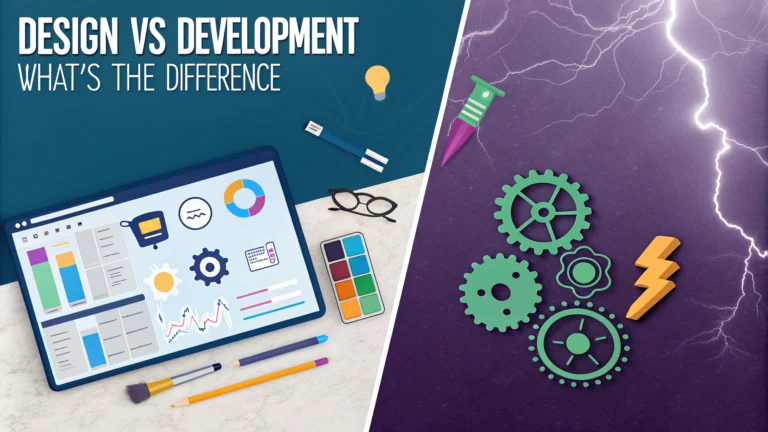While design and development often work hand-in-hand, understanding their distinct roles helps create better digital products. These two disciplines require different skill sets, tools, and approaches – yet they’re equally important for successful project outcomes.
Think of design as the blueprint and development as the construction. Designers focus on user experience and visual elements, while developers bring those designs to life through code and programming.
Understanding the Core Functions
Design focuses on the user interface (UI), user experience (UX), and visual elements that make products intuitive and appealing. Development involves writing code, implementing functionality, and ensuring technical performance.
- Design responsibilities:
- Creating wireframes and prototypes
- Developing visual brand identity
- User research and testing
- Interface layout and navigation
- Development responsibilities:
- Writing and testing code
- Building backend systems
- Implementing security measures
- Performance optimization
Essential Tools and Skills
| Design Tools | Development Tools |
|---|---|
| Adobe Creative Suite | Visual Studio Code |
| Figma | Git |
| Sketch | JavaScript frameworks |
| InVision | Database management systems |
Collaboration and Workflow
Successful projects require seamless integration between design and development teams. Understanding each other’s constraints and capabilities leads to more efficient workflows.
“Good design is good business, but great development makes it possible.”
Common Challenges and Solutions
Communication gaps between design and development teams can slow down projects and create misaligned expectations. Setting up regular check-ins and using collaborative tools helps bridge these gaps.
- Key challenges:
- Technical limitations affecting design implementation
- Different interpretations of design specifications
- Timeline misalignment between teams
- Inconsistent feedback loops
Solutions include using design systems, establishing clear documentation, and maintaining version control for both design assets and code.
Career Paths and Specializations
Each field offers unique growth opportunities and specialization paths. Understanding these options helps professionals make informed career decisions.
| Design Specializations | Development Specializations |
|---|---|
| UX Research | Frontend Development |
| Motion Design | Backend Development |
| Product Design | Full Stack Development |
| Design Systems | DevOps |
Best Practices for Integration
Successful integration requires structured processes and clear communication channels. Teams should establish shared guidelines and expectations early in the project lifecycle.
- Integration tips:
- Create shared design tokens and style guides
- Use component libraries
- Implement automated handoff tools
- Schedule regular cross-team reviews
“The best designs emerge from close collaboration between designers and developers.”
Moving Forward: Bridging the Gap
Modern tools and practices continue to blur the lines between design and development. Learning basic skills from both disciplines makes professionals more effective team members.
Focus on building cross-functional knowledge and maintaining open communication channels. This approach leads to smoother workflows and better end products.
- Steps for success:
- Learn basic coding principles (for designers)
- Study design fundamentals (for developers)
- Use collaborative platforms
- Stay updated with industry tools
Frequently Asked Questions: Design vs Development
What is the main difference between design and development?
Design focuses on the visual and user experience aspects of a product, while development involves writing code and implementing technical functionality. Designers create layouts and user interfaces; developers build the working product.
Do web designers need to know how to code?
While not mandatory, basic knowledge of HTML and CSS is beneficial for web designers. Understanding code helps designers create more realistic and implementable designs.
What tools do UI designers use vs web developers?
Designer tools:
- Figma
- Adobe XD
- Sketch
Developer tools:
- Visual Studio Code
- Git
- Command Line
Which pays more: UX design or web development?
Generally, web developers earn slightly higher salaries, with senior developers earning significantly more. However, experienced UX designers at major companies can command comparable salaries.
Can one person be both a designer and developer?
Yes, these individuals are called full-stack designers or designer-developers. They understand both visual design principles and coding, though usually specialize more in one area.
How long does it take to become a web designer vs web developer?
Basic web design skills can be learned in 3-6 months, while becoming a proficient web developer typically takes 6-12 months of intensive study. Mastery in either field requires several years of experience.
What’s the difference between UX design and front-end development?
UX design focuses on user research, wireframing, and creating user-friendly interfaces. Front-end development involves implementing these designs using HTML, CSS, and JavaScript.
Do web designers or developers work more directly with clients?
Designers typically have more direct client interaction during the initial phases of projects, as they work on visualizing client requirements. Developers usually have less direct client contact.
What programming languages do web designers need vs developers?
| Designers | Developers |
|---|---|
| Basic HTML/CSS | HTML/CSS/JavaScript |
| Optional JavaScript | PHP/Python/Ruby |
| Design software skills | SQL/Database languages |
Is UI/UX design harder than web development?
Neither is inherently harder – they require different skill sets. Design demands creativity and user psychology understanding, while development needs logical thinking and technical problem-solving abilities.



















